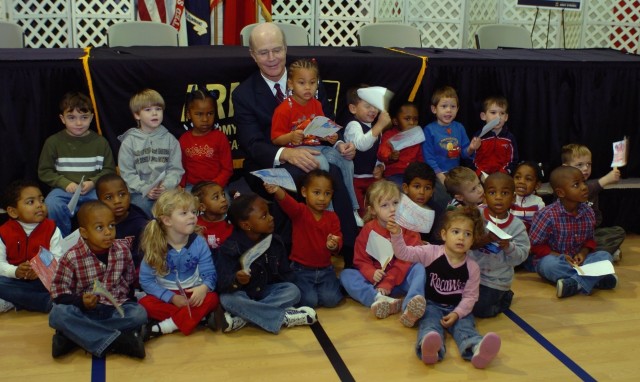WASHINGTON (Army News Service, Aug. 15, 2008) -- Today and in the coming months, the Army will be celebrating the 25th anniversary of the creation of the Army Family Action Plan, senior leaders said, citing an ongoing commitment to families embodied in the Army Family Covenant.
The Army Family Covenant says that Soldiers' strength comes from their families. It pledges to provide for and support those families, increase the accessibility and quality of healthcare, improve Soldier and family housing and standardize and fund family programs and services.
Then- Army Chief of Staff Gen. John A. Wickham signed a ground-breaking "white paper" titled "The Army Family" on Aug. 15, 1983. It identified the need for the Army to increase support to its families. Wickham and his staff asserted that a healthy family environment allows Soldiers to concentrate more fully on their mission.
"The readiness of our all-volunteer force depends on the health of the families," said Secretary of the Army Pete Geren. "I can assure you that your Army leadership understands the important contribution each and every one of you makes. We need to make sure we step up and provide the support families need so the Army Family stays healthy and ready."
The Army was in transition in 1983 -- the Army was moving from an organization composed mostly of draftees and short-term enlistees, to an all-volunteer, professional force consisting of more than 50 percent married personnel. Wickham set a new vision and course for Army Families that carries on to this day.
AFAP was created with an initial planning conference in 1984, the Year of the Army Family. Its mission: to help Army leaders address the needs and concerns of family members. The program uses family representatives from around the world to identify issues that will improve the standard of living for Soldiers and their families. This feedback to leaders provides for policy changes that become tangible end-products for the Army Family.
AFAP beneficiaries include Soldiers, retirees, Department of Army civilian employees and all their family members. Delegates meet and vote on the top 5 conference issues every year. These issues are briefed at the next general-officer steering committee. The process involves the voicing of what's working and what isn't; and provides a recommended solution to fix it. Senior Army leadership is alerted to areas of concern that need their attention.
Six hundred thirty-three issues have been identified in the past 24 years. AFAP has driven 101 legislative changes, 147 Army policy and regulatory changes and 165 improved programs and services.
"We recognize what it takes to be an Army Family, and that our Soldiers draw great strength from their families," said Army Chief of Staff Gen. George W. Casey Jr. "The welfare of Army Families is increasingly important to all of us," he said, adding that the Army was committed to building a partnership with families. That partnership is embodied in the Army Family Covenant.
Child care in the Army, officials point out, exemplifies the success of the AFAP process:
There was no funding for child care construction in 1981
Between 1983 and 2006, 132 child care facilities had been built or renovated, at a total cost of $325 million.
The Army funded 22 new Child Development Centers in FY07; 92 Child
Development Center projects are programmed during FY08-13.
One new Youth Center was funded in FY07; 24 Youth Center projects are programmed during FY08-12.
Examples of family support programs and services impacted by the AFAP process include:
Family Readiness Groups are currently funded, staffed and a unit requirement as a result of policy changes made through the AFAP process.
The Family Advocacy Program, created after an AFAP issue identified the need to assist families in crisis, provided training and support to more than 164,000 Soldiers or families in FY06.
Financial Readiness Program managers conducted 110,041 financial readiness courses and provided individual support to 49,681.
More than 50,000 spouses have found employment through the Army Spouse Employment Program.
Army garrisons now provide more than 50 different support programs/activities (on average) ranging from "Army
Family Team Building" classes to Youth Services Activities designed to ease the burden on the spouses of deployed Soldiers.
Throughout the coming months and leading up to the Army Family Action Plan national meeting in Alexandria, Va., in January 2009, installations and garrisons around the world will conduct local AFAP meetings to identify key issues to be addressed by Army leadership.
Thanks to the foresight of Gen. Wickham and his staff 25 years ago, officials said, the needs of the Army Family remain front and center in the hearts and minds of Army leaders around the world today and into the future.


Social Sharing